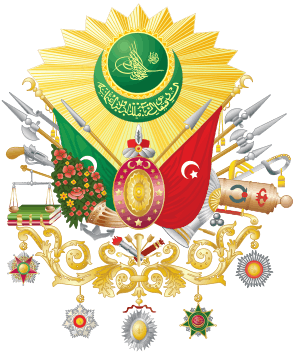Ahmed Nihad
| Ahmed Nihad | |
|---|---|
| H.I.H. Prince Ahmed Nihad | |
 | |
| Head of House of Osman | |
| Term | 23 August 1944 – 4 June 1954 |
| Predecessor | Abdülmecid II |
| Successor | Osman Fuad |
| Born |
5 July 1883 Istanbul , Ottoman Empire |
| Died |
4 June 1954 (aged 70) Beirut, Lebanon |
| Spouse |
Safiru Hanım Nezihe Hanım Nevrestan Hanım |
| Issue | Şehzade Ali Vâsib |
| House | Imperial House of Osman |
| Father | Şehzade Mehmed Selaheddin |
| Mother | Naziknaz Hanım |
| Religion | Sunni Islam |
Ahmed Nihad [1][2] (5 July 1883 – 4 June 1954), 38th Head of the Imperial House of Osman from 1944 to 1954, was the 38th and second post-imperial head of the Imperial House of Osman.
He was born in Çırağan Palace, Ortaköy on 5 July 1883, as the eldest son of Prince Mehmed Selaheddin Efendi, by his wife, Naziknaz Hanım, and grandson of Sultan Mehmed V. He was educated privately. He was promoted to the rank of Colonel of Infantry of the Ottoman Army.
Ahmed Efendi received the honors of the Collar of the Hanedan-ı-Ali-Osman and the Nişan-ı-Ali-Imtiyaz. He was succeeded on the death of his cousin, Prince Abdulmecid Efendi, the last Caliph of Islam, as Head of the Imperial House of Osman on 23 August 1944, to become the first head of the Ottoman family not to hold the office of Caliph of Islam since his ancestor Sultan Selim I was granted this title in 1517. Had he been the reigning Sultan he would have been Sultan Ahmed IV.
Life
Ahmed Nihad Efendi, spent his entire childhood and early adulthood confined in Çırağan Palace, Ortaköy in Constantinople (Istanbul). The Palace served as an enforced residence to his grandfather Sultan Murad V, who had been deposed in 1876, and replaced by his brother, Sultan Abdul Hamid II. The restrictions imposed on the former Sultan extended to his entire family, and were not lifted until his death in 1904. On the death of his grandfather, Ahmed Nihad left his enforced confinement at Çırağan Palace and lived for a few years in the properties rented by his father in the Feneryolu, Kuruçeşme and Ortaköy districts of Istanbul. From 1911 until his exile he lived in the mansion which he had designed himself and had built on Serencebey hill overlooking Beşiktaş and from 1915 he would spend the summer months at the Muradiye Pavilion in Kurbağalıdere. However, he would only enjoy 20 years of freedom in his homeland, as following the establishment of the Republic of Turkey, and the abolition of the Ottoman Sultanate and the Caliphate, the entire Imperial Ottoman family were forced into exile in March 1924.
Aged 41, Ahmed Nihad, left Turkey never to return, since he died before the decree of exile was lifted. He went into exile with both his wives, first to Budapest for a few months, then to Nice in France for 12 years. As the former Ottoman Sultan Mehmed VI had settled in San Remo, many members of the family had congregated to the South of France. In 1937 he moved to Beirut, Lebanon where he lived for the rest of his life. Life in exile was always very difficult since members of the Imperial Ottoman family had no financial means, and all yearned to return to their homeland but for Ahmed Nihad life was made harder after he suffered a stroke which left him handicapped. Ahmed Nihad became the head of the exiled Imperial family in August 1944, but was the first head of the Ottoman family since the early 16th century who did not hold the title of Caliph of Islam. Since many members of the family had settled in the Middle East following their exile, they frequently visited him in Beirut to pay homage, as was the custom of the family. Ahmed Nihad was a pious and dutiful man, who had a talent for architectural design and carpentry. He was also a talented composer and an accomplished musician and painter.
Bibliography
- Osmanoğlu, Osman Selaheddin (2003). Bir Şehzadenin Hâtırâtı. Turkey: Yapı Kredi Yayınları. ISBN 975-08-0878-9. OCLC 469568294. Retrieved 20 July 2011.
References
- ↑ Almanach de Gotha (184th ed.). Almanach de Gotha. 2000. pp. 365, 912–915.
- ↑ Burke's Royal Families of the World (2 ed.). Burke's Peerage. 1980. p. 247.
External links
- "Genealogy of the Ottoman Family". Archived from the original on 29 July 2008. Retrieved 19 August 2008.
- Family Tree, descendants of Sultan Mahmud II. Retrieved 2011-02-28.
| Ahmed Nihad Born: 6 July 1883 Died: 4 June 1954 | ||
| Titles in pretence | ||
|---|---|---|
| Preceded by Abdülmecid II |
— TITULAR — Sultan of the Ottoman Empire 23 August 1944 – 4 June 1954 Reason for succession failure: Empire abolished in 1922 |
Succeeded by Osman Fuad |

